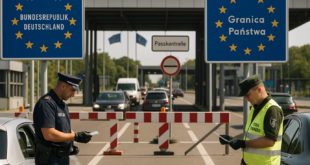Germany’s upper house of the federal parliament Bundesrat has approved the federal government’s plan to make drivers pay for using the country’s highways. Neighbouring countries have threatened to take legal action. Ben Knight reports.
The Bundesrat finally passed Germany’s highway toll bill on Friday. The upper house of the German parliament, made up of the 16 state governments, voted for the bill despite significant resistance from states on Germany’s borders. The toll will therefore enter German law when it is signed by President Frank-Walter Steinmeier.
Despite previously voicing concerns, the states voted not to raise objections and establish a mediation committee with the lower house, the Bundestag, which could have delayed the bill until after September’s election.
The vote ended a tortuous four-year legislative process, which saw the toll – called an “infrastructure fee” – shot down by the European Commission in 2015, on the grounds that it would represent a disadvantage for foreign drivers, and so contravene European law.
The autobahn toll was a central project of the conservative wing of Germany’s coalition government – the Christian Social Union (CSU), Bavarian sister party of Angela Merkel’s Christian Democratic Union (CDU) – and therefore became a cause for CSU Transport Minister Alexander Dobrindt.
It was left to Dobrindt to negotiate alterations to the bill with the European Commission – one of the outcomes of which was that foreign motorists could pay different short-term tolls. Meanwhile, German drivers of cars carrying the latest “Euro 6” emissions standard are set to pay less motor vehicle tax to compensate for the toll.
Economic damage and legal challenge
Despite the Bundesrat vote, individual state governments continued to voice their discontent on Friday. “In the border regions, the customers from neighbouring countries are vital,” said Volker Wissing, transport minister in Rhineland-Palatinate, a state that borders Belgium, Luxembourg and France.
Wissing’s state had voted in favour of the mediation committee, which would have tried to secure stretches of toll-free autobahns near Germany’s borders.
There was similar apprehension from the southern state of Baden-Württemberg, whose Transport Minister Winfried Hermann told the Bundesrat that the toll would create “great political damage” and was “not a good sign for Europe.”
The counterpoint came, naturally, from Bavaria and the CSU, whose leader Horst Seehofer insisted that the measure brought “justice” for Europe’s roads. “We Germans pay in almost all European countries when we use the roads there,” he said.
The bill also met resistance from Germany’s neighbours: Austria, the Netherlands and Belgium have all threatened to take legal action before, with Austria in particular displaying noisy opposition. “I consider this toll discriminatory and not reconcilable with EU law,” Austrian Transport Minister Jörg Leichtfried said. “We know now that Germany has agreed a foreigner toll.”
The Austrian government is planning to take Germany to the European Court of Justice over the issue – even though Austria, like many small European countries, also charges a toll for use of its highways. The Netherlands, meanwhile, was more reserved: Infrastructure Minister Melanie Schultz said on Friday that the Dutch government would wait for a ruling from the European Commission.
And yet Austria may have a case: a legal assessment commissioned by the German parliament (at the behest of the Green party) concluded in February that the toll did indeed violate European discrimination law – despite the alterations.
Foreigner toll
When the CSU originally put the toll in its 2013 election manifesto, it was expressly pitched as a “toll for foreign travellers on German highways” – a violation of EU’s anti-discrimination law. Perhaps alert to this, Merkel told a TV debate in the run-up to that election that “there would be no toll” as long as she was in office.
It subsequently passed into German law in 2015 – over the objections of many states – only for the European Commission to block it and usher in more than a year of negotiations.
The upshot is that, if all goes to plan, as of 2019 German car drivers will pay a toll on all federal roads and highways, while foreign motorists will only pay to use the 13,000-kilometer (8,000-mile) highway (autobahn) network – a concession made to the EU.
The exact prices, depending on the size and environmental standards of the car, will range between 67 euros and 130 euros ($72 – $140) per year – with drivers of gasoline cars paying less than diesel, as will drivers of cars classified as “Euro 6.”
Foreign drivers will also have the option of paying short-term tolls – either for 10 days or two months – costing between 2.50 euros and 50 euros. The toll will be charged via an electronic system, and enforced with random checks on registration plates.
Exemptions were also built in to accommodate some of the myriad objections: German motorists will see their car taxes reduced, while motorcycles, electric cars, cars used by the disabled and ambulances will all be exempt.
There has also been some argument over exactly how much the toll could bring Germany’s coffers. While Dobrindt has stuck by the 500 million euros ($537 million) a year his department once calculated – many others, including the General German Automobile Club (ADAC), have estimated around half that – arguing that the costs of introducing the toll and the potential impact on tourism and industry had to be factored in.
© Deutsche Welle
 THE AFRICAN COURIER. Reporting Africa and its Diaspora! The African Courier is an international magazine published in Germany to report on Africa and the Diaspora African experience. The first issue of the bimonthly magazine appeared on the newsstands on 15 February 1998. The African Courier is a communication forum for European-African political, economic and cultural exchanges, and a voice for Africa in Europe.
THE AFRICAN COURIER. Reporting Africa and its Diaspora! The African Courier is an international magazine published in Germany to report on Africa and the Diaspora African experience. The first issue of the bimonthly magazine appeared on the newsstands on 15 February 1998. The African Courier is a communication forum for European-African political, economic and cultural exchanges, and a voice for Africa in Europe.
































